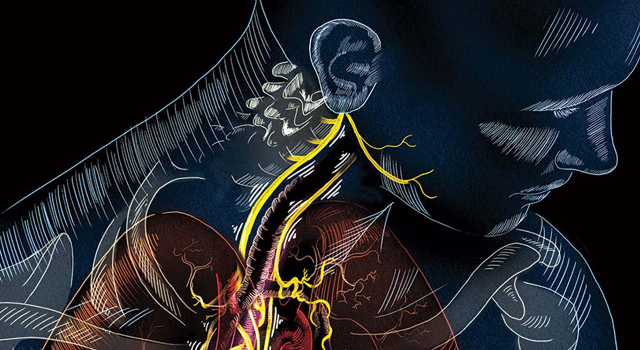The importance of mental health is an undeniable truth. It’s as important to take care of one’s mental health as it is to take care of one’s physical health, if not more. There’re are various tools, techniques and hacks to boost and sustain one’s mental well being. In this article, we touch upon a lesser known technique to do so; stimulating the Vagus Nerve.
What in the good heavens is a vagus nerve?!
The vagus nerve is the longest nerve in the human body, connecting our brains to many major organs including the heart, lungs, intestines, stomach, etc. It happens to be a key component of the parasympathetic system. Setting aside the scientific mumbo jumbo, it basically means that the vagus nerve is responsible for stimulating a lot of the human body’s activities when it’s at rest. It influences your breathing, your heart rate and even your digestive functions. All these can majorly affect your mental health as well.
Now, how can one use the vagus nerve to ensure better mental health? You basically need to stimulate the vagus nerve to increase the vagal tone. Increasing the vagal tone activates the parasympathetic nervous system which means your body can relax faster after stress.
To quote Dr. Mladen Gloubic, MD, Medical Director, Cleveland Clinic :
It’s almost like yin and yang. The vagal response reduces stress. It reduces our heart rate and blood pressure. It changes the function of certain parts of the brain, stimulates digestion, all those things that happen when we are relaxed
So how can one stimulate their vagus nerve? Here’s how?
1. Cold Exposure
Exposure to cold is known to activate the vagus nerve. Also, exposure to cold temperatures on a regular basis lowers the “fight or flight” response and increases parasympathetic activity through the vagus nerve. So go and take that cold shower that you’re dreading. It’s gonna be worth it, or just dunk your head in a bucket of ice cold water.
2. Deep and slow breathing
On average, people tend to take 10-14 breaths per minute. Instead, if someone were to slow it down to about 6 breaths a minute, it would reduce anxiety and relieve stress by – you guessed it – stimulating the vagus nerve. The breathing must be diaphragmatic i.e. when you inhale, your stomach should expand outward, and then you exhale slowly, and in a few breaths, you will find yourself more relaxed. So breaaaaathe…..
3. Exercising
Apart from various other positive effects on both your physical and mental health, exercise also stimulates the vagus nerve. If you’re looking for steps to get into a routine of working out regularly, read this. Time to get those running shoes out of storage maybe?
4. Yoga and Meditation
By stimulating the vagus nerve, yoga increases GABA, a neurotransmitter that has a calming effect on the brain.
Meditation is also known to increase one’s vagal tone. It also increases positive emotions and makes one feel good about themselves.
5. Socialising and Laughing
When you think about your positive social connections, it stimulates the vagus nerve and leads to a rise in positive emotions.
Laughter increases heart rate variability and works as a mood booster. It often appears as a side effect of vagus nerve stimulation, and thus may be do the reverse as well, that is positively affect your vagal tone. So, time to party then?
6. Probiotics
Who knew, the gut bacteria in your bowl of curd actually stimulates your vagus nerve. The bacteria increase GABA and reduce stress hormones, which is all facilitated by the stimulation of the vagus nerve. So gulp that bowl of curd down and feel a positive change in your mental health.
Want more tips on how to improve your mental health? Want to become the happiest version of yourselves? Talk to an Expert at YourDOST today.
